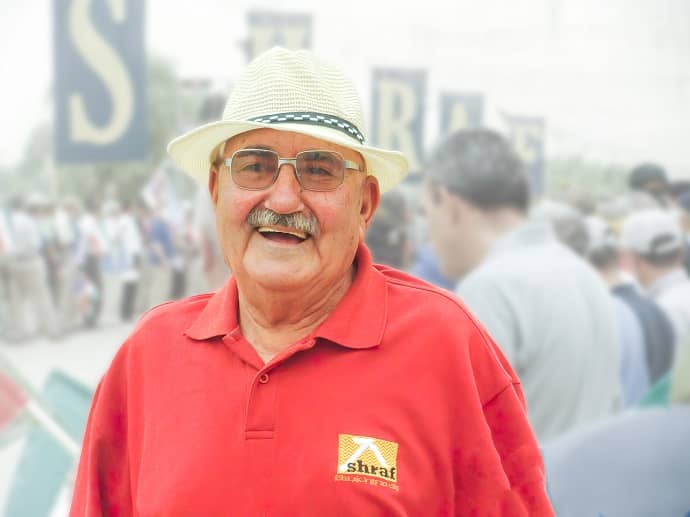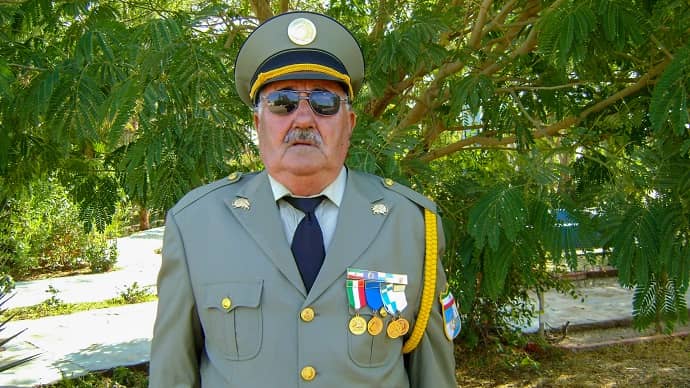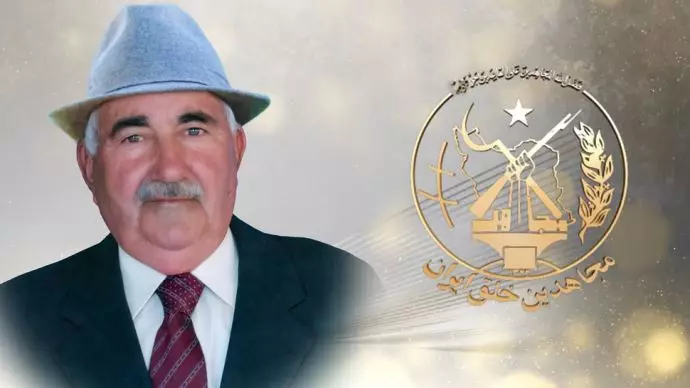Nourmorad Kolajouyi, a beloved member of the main Iranian opposition who charted a long journey of struggle for freedom dating back to the 1950s when he supported the late Iranian prime minister Dr. Mohammad Mossaddeq, passed away January 20, 2022. He was 87.
Known affectionately as “Nourmorad” among members of the opposition Mujahedin-e Khalq (MEK) in Albania, Mr. Kolajouyi had a painful and long personal story, intertwined with defining moments in Iran’s history.
Following the MEK’s relocation from Iraq starting in 2016, Nourmorad resided in Ashraf-3, Albania, until his death resulting from heart failure and lung complications.

Nourmorad was born in northeastern Iran, in the city of Bojnourd, in 1935. But his family roots were planted in the western province of Lorestan where the majority Lor tribes had settled. In the 1920s, during the despotic reign of Reza Pahlavi (aka Reza Khan or Reza Shah), the Lors were brutally suppressed and many viciously murdered by the Shah’s troops.
Writing later in his memoirs, Nourmorad recalled: “I heard from my father that they were held captive by the armed forces (of Reza Pahlavi) for two months. They later forced our family to relocate to other areas. Everyone was chained, even the women and children. … They forced these people to march in that condition all the way (to the east) to cities like Bojnourd, Shirvan, and Quchan. They walked for six or seven months, in the cold and the heat.”
“The brutality that descended upon Lorestan by Reza Pahlavi had not been matched even by the Mongol invasion,” he added.
In 1953, when Nourmorad was 18
Reza Pahlavi’s son, Mohammad-Reza Shah, entrenched the monarchical dictatorship through a coup against Iran’s first and only democratically elected and popular prime minister, Dr. Mohammad Mossaddeq. Mossadeq not only sought to nationalize the oil industry, but during the few short years of his premiership, he also strengthened democracy by supporting freedom of the press and adopting progressive laws.
Due to his support for Mossadeq in the early 1950s, Nourmorad was arrested by the Shah shortly after the coup, in September 1953. He spent five months in prison and endured torture.
Following popular protests that led to the downfall of the Shah in 1979, when fundamentalist clerics usurped power, Nourmorad gravitated towards the democratic ideals of the MEK and particularly the speeches of the resistance’s leader Massoud Rajavi. He was frequently attacked and beaten by the theocratic regime’s thugs for supporting the MEK. Eventually, he was arrested again in 1981 for participating in pro-MEK rallies in Andimeshk city and was held captive for two weeks while enduring savage beatings.
During the Iran-Iraq war, he was taken as a prisoner of war by Iraqi forces and subsequently spent 9 years in captivity until he rejoined the MEK on June 20, 1989.

He spent the rest of his life at the MEK’s Camp Ashraf in Iraq and later at Ashraf-3 in Albania, where he died. He thus spent 32 years among MEK members fighting for a secular, democratic and non-nuclear republic that rejects both the Shah (monarchy) and the Sheikh (theocracy). He was particularly loved by the residents for his industriousness in the field of farming and for creating lush gardens.
Nourmorad had eight children but left his personal life to join the MEK. Following the US invasion of Iraq in 2003, the Iranian regime penetrated Iraq, sending scores of agents and terrorists to harm MEK members in Camp Ashraf. Tehran’s Ministry of Intelligence and Security (MOIS) used a number of Nourmorad’s children against him in order to force him to abandon the struggle for democracy.
The regime and its Iraqi proxies installed 320 loudspeakers around Camp Ashraf, blasting hateful messages by so-called “families” of residents for 677 days. Such white torture was meant to break down MEK members psychologically, but it failed in the end.
Upon news of Nourmorad’s passing, Mrs. Maryam Rajavi, the President-elect of the National Council of Resistance of Iran (NCRI), expressed her condolences while describing Nourmorad as “one of the most courageous and resilient fighters of Lorestan.” He “was truly one of the proudest individuals in the history of Lorestan and Bojnourd,” she added.
In his later years, Nourmorad wrote a book entitled “Mossaddeq and Reza Khan,” describing in detail the brutality exercised by Reza Pahlavi against the people of Lorestan. He wrote: “They massacred people using swords and guns. One of our relatives refused to be handcuffed and they killed him by striking him with stones.”
Former US Supreme Court Justice William Douglas had previously written that between 1924 and 1927, Reza Shah committed major atrocities and crimes against humanity against the Lors. He explained how Reza Shah’s forces decapitated detainees in gruesome ways.
Nourmorad had repeatedly said that “even after I die, I will continue to fight against the mullahs in the afterlife.”





